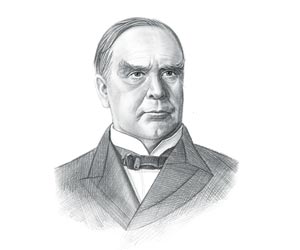|
The Erdman Act was a
Railway Labor Act that set up arbitration procedures through the
policy of mediation and conciliation to settle railway disputes.
The Erdman Act of 1898 for kids: Background History
The Erdman Act of 1898 was passed in the wake of industrial disputes
involving the railroad workers. The events of the
Pullman
Strike
that occured in 1894 were still in the minds of the politicians and
the general public. The Pullman strike had started in Chicago and
spread right across the country involving over 100,000
employees working on 24 different railroads.
The strike had turned violent and President Cleveland was forced to
send in US troops to quell the riots. The military used harsh
methods to suppress the strikers resulting in deaths,
serious injuries and hundreds of
arrests.
Reasons and Purpose of the Erdman Act of 1898
The reasons and purpose of the Erdman Act were:
-
To alleviate labor unrest
in the railroad industry by requiring mediation of any labor
dispute
-
To avoid a repetition of
another railroad strike
-
It aimed to provide a
process to settle railroad disputes that were "seriously
interrupting or threatening to interrupt" interstate commerce
Erdman Act for kids:
Provisions of the Erdman Act
What did the 1898 Erdman Act do? The provisions of the
Erdman Act were as follows:
-
The Erdman law provided
for arbitration for disputes between the interstate railroads
and their workers organized into unions
-
The law applied to
employees who worked on the moving trains such as the drivers,
conductors, brakemen and firemen
-
Maintenance workers and
station clerks did not come under the jurisdiction of the Erdman
Act as their work was not related to interstate work
-
The law only applied if
the train transported freight and passengers between states
-
The Erdman Act set up
arbitration procedures via the policy of mediation and
conciliation to settle railroad disputes
-
The act provided for an
arbitration board whose decision would be binding
-
The law made it illegal
for workers to strike during the arbitration process
-
The law also made it
illegal for companies to fire a worker during the arbitration
process, except for neglecting duty or inefficiency
-
The act prohibited the use
of 'yellow-dog' contracts on the railroads. ('Yellow-dog' labor
contracts included a clause stating that an employee would not
join a Union)
Erdman Act for kids:
'Yellow-dog' Contracts Provision
overturned
The provision relating to 'Yellow-dog' labor contracts was
overturned by the Supreme Court as an unconstitutional infringement
upon the freedom of contract
Significance of the Erdman Act
Railroad workers were granted more rights under the
provisions of the 1916 Adamson Act in 1916 that shortened the
working day from 10 hours to 8 hours at the same rate of pay.
For additional facts refer to the
History of Labor Unions. |

